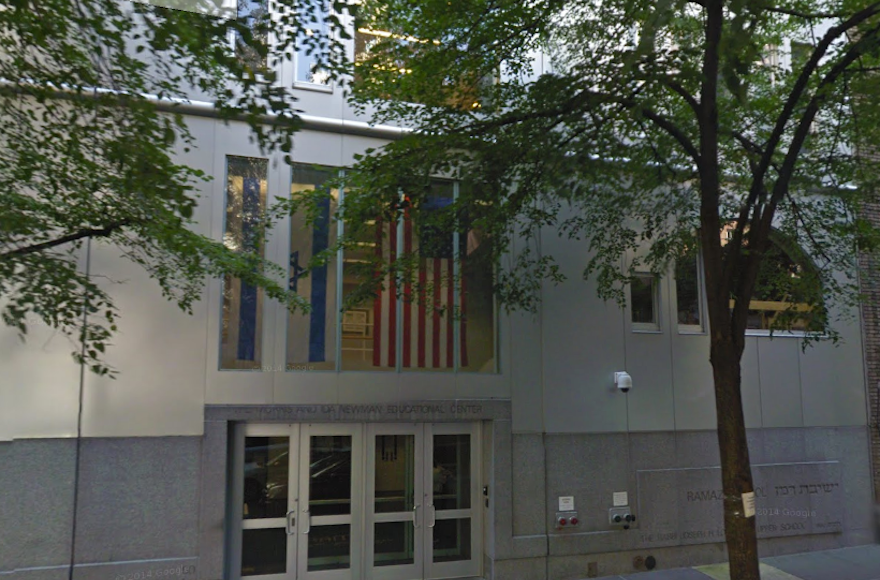Prestigious New York Jewish school apologizes for ignoring molestation reports
Published August 31, 2018

A view of The Ramaz School in New York City. (Google Street View)
(JTA) — Former staff at the Ramaz Jewish school in Manhattan failed to act appropriately on reports they had received in the 1970s of molestation by a former teacher, the school said.
ADVERTISEMENT
After Stanley Rosenfeld left Ramaz in 1974, administrators learned that he had engaged in sexual misconduct with children while working at another school in Westchester County, New York, according to a report published Thursday by a law firm hired by Ramaz to investigate the school’s own conduct.
But the school at the time did not alert third parties about what they learned. While the investigation found “no direct evidence that anyone at
Ramaz knew of Rosenfeld’s misconduct when Rosenfeld was hired or while
Rosenfeld was employed at Ramaz,” it concluded that administrators could have later taken action while Rosenfeld was still employed at a Jewish summer camp or when he interacted “with the larger Ramaz community.”
The investigators could not confirm second-hand accounts that Rosenfeld was terminated as a result of misconduct with Ramaz students.
Parents of at least one alleged victim said they met with Rabbi Haskel Lookstein, who headed Ramaz at the time, on the issue but he did not alert authorities, according to testimonies heard by the investigators who compiled the report. Lookstein told investigators working for the school that he does not recall a parent telling him of abuse of any Ramaz student.
Lookstein is one of the United States’ most prominent Modern Orthodox rabbis. He said he had heard of abuse by Rosenfeld after the educator was no longer working at Ramaz, which is one of the New York area’s most prestigious Modern Orthodox day schools.
ADVERTISEMENT
The alleged victims of Rosenfeld mentioned in the report were not Ramaz students. They were affiliated with Westchester Day School, located near White Plains, about 20 miles north of Ramaz, the report said.
The investigators who wrote the report “received reports that Rosenfeld sexually abused at least three boys” affiliated with Westchester Day School.
Ramaz and another Jewish school where Rosenfeld had worked in the 1970s, the Salanter Akiba Riverdale Academy in the Bronx, known as SAR, conducted this year investigations into his conduct following complaints by former students who came forth.
“We offer our deepest apologies to the victims and their families, and openly acknowledge all the ways in which we have erred in cases of abuse,” Philip Wilner, chairman of the board at Ramaz, wrote in an email accompanying the report.
He noted that the school today has a “zero-tolerance policy for any inappropriate behavior between a Ramaz employee and a student” and that it conducts extensive background checks on employees and other adults who interact with students.
In 2001, Rosenfeld was convicted of two counts of child molestation for abusing a 12-year-old bar mitzvah student while serving as cantor of Temple Am David in Warwick, Rhode Island. He was given a suspended sentence but served 18 months in prison after violating probation.
The allegations detailed in the report are said to have occurred before the abuses for which Rosenfeld was convicted.
A Forward reporter located Rosenfeld living in a nursing home in Providence, Rhode Island. He is 84 years old, the paper reported this week.
Rosenfeld’s alleged abuses of the three Westchester boys included “stroking the boys’ genitals and engaging in sexual acts, including oral sex,” the Ramaz report said.
Some of the abuse allegedly occurred at a sleepover Rosenfeld hosted for several boys at his home. Others occurred at the home of one of the boys when Rosenfeld was visiting, according to the report. Reportedly, the abuse of at least one of the three boys likely continued while Rosenfeld was employed at Ramaz, though the boy was not affiliated with Ramaz.
Rosenfeld admitted to the investigators that he regularly touched children inappropriately whenever he had the opportunity, including, but not limited to, during his time at Ramaz, the investigators wrote.
However, he did not recall discussing his conduct with anyone in the Ramaz administration and did not recall any complaints about his conduct while at Ramaz. He admitted also to molesting boys at Camp Massad, a Jewish summer camp in Pennsylvania that closed in 1981, where Rosenfeld had also worked. Many Ramaz students attended and many faculty worked at the camp.
“There is no evidence of any Ramaz or Camp Massad employee or administrator taking action with respect to Rosenfeld, either referring his conduct to law enforcement or warning other schools about the potential for misconduct,” according to the report.
The report included additional molestation cases, allegedly committed by staff at Ramaz in the 1970s and 1980s.
Richard Andron taught after-school karate classes at Ramaz in the late 1970s. “Tthere is evidence that Andron sexually abused multiple Ramaz students during his time” there, the report said. He allegedly “stroked boys’ genitals while they slept” at his house on sleepover. Andron declined to comment on these claims, the investigators wrote.
They were not “unable to determine whether Andron’s misconduct with Ramaz students was reported to Ramaz while Andron was still an instructor at the school,” the investigators added.
Albert Goetz was terminated as a teacher at Ramaz in 2005 for engaging in improper behavior with female students in the years 1976-1987, according to the report. Goetz photographed the feet of at least 17 female students. In the early 1980s, Goetz, by his own admission, engaged in romantic and physical relationships with two female students, the report said.
Another incident involving taking pictures of feet by Goetz prompted complaints and psychiatric evaluation of him at the insistence of Ramaz faculty. Goetz was allowed to keep teaching.
Lookstein, who was Goetz’s boss, told investigators that with the benefit of hindsight, he recognizes that he “could have handled the situation better,“ the report’s authors wrote.














